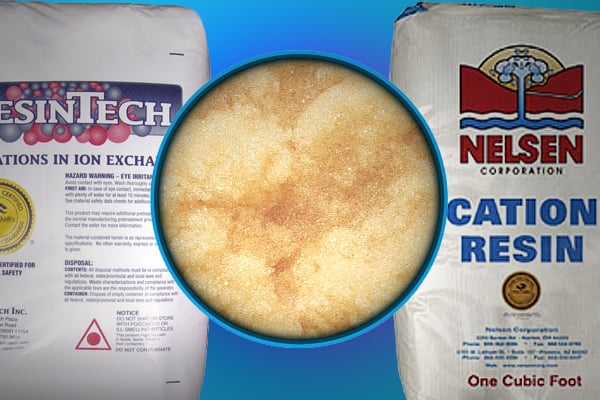What’s the Difference Between Fine Mesh Resin and Standard Resin When Removing Iron?


Fine Mesh vs Standard Softener Resin for Iron Removal
A customer recently asked us about the difference between fine mesh and standard resin for removing iron with a water softener. While we generally recommend an iron filter, a water softener can work under the right conditions for iron removal.
A water softener can be effective if your water’s pH is near 7.0 and your iron is in the rusted (ferric) form—not clear (ferrous). In these cases, fine mesh resin is the better option.
Fine mesh resin is packed more tightly and has a smaller bead size than standard resin, giving it a larger surface area to capture iron. Under optimal conditions, it can remove up to 10 ppm of iron, though 5 ppm is a more realistic expectation.
That said, there are a few drawbacks to using fine mesh resin. It’s more expensive than standard resin and can foul more easily if not properly maintained. If iron builds up on the resin beads without regular cleaning, it can lead to iron slime and reduced performance. Resin cleaners are often required to restore function.
This fouling issue can happen with standard resin, too, but it’s more common with fine mesh because of its tighter packing. When fouled, the resin’s ability to perform cation exchange—replacing calcium and magnesium with sodium—is reduced.
With either resin type, you may also encounter injector fouling. As the water softener pulls brine through a small injector, iron in the water can oxidize and clog this part of the system. Fortunately, these injectors are easy to clean, and regular maintenance can minimize fouling.
To protect your fine mesh resin, consider using an automatic resin cleaner feeder or regenerating the system every few days. However, fine mesh resin needs more frequent backwashing, which increases brine solution use over time.
Understanding Ion Exchange Resin
Ion exchange resin is a crucial component in water softeners, designed to remove dissolved minerals that cause water hardness. These resins are composed of tiny spherical beads packed into a “bed” within the water softener tank. Each resin bead carries a negative charge, which attracts positively charged ions such as calcium and magnesium—common culprits in hard water.
The resin beads are pre-loaded with positively charged sodium ions. When hard water flows through the water softener tank, the resin beads attract and hold onto the hardness ions, releasing the sodium ions into the water in their place. This ion exchange process effectively softens the water by replacing the hardness ions with sodium ions, making it more suitable for household use.
How Water Softeners Use Resin
Water softeners utilize resin to effectively remove dissolved minerals from water supplies. Inside the water softener tank, the resin is arranged in a “bed” through which the water flows. As the water passes through this resin bed, the negatively charged resin beads attract and capture the positively charged hardness ions, such as calcium and magnesium.
During this process, the resin beads release sodium ions into the water, which replace the captured hardness ions. This exchange softens the water and prevents the buildup of scale in plumbing fixtures and appliances. Over time, the resin beads become saturated with hardness ions and need to be regenerated. During regeneration, a brine solution flushes the resin bed, removing the captured minerals and recharging the beads with sodium ions, readying them for another cycle of softening.
Fine Mesh Resin vs Standard Resin
When choosing between fine mesh resin and standard resin for your water softener, it’s important to understand the differences and benefits of each. Fine mesh resin is composed of smaller, more tightly packed beads, which provide a greater surface area for ion exchange. This increased surface area makes fine mesh resin particularly effective at removing iron and other heavy metals from the water, in addition to the usual hardness ions.
On the other hand, while less expensive, standard resin is still highly effective at softening water by removing dissolved minerals. However, it may not be as efficient as fine mesh resin in dealing with iron. Fine mesh resin’s ability to handle higher concentrations of iron makes it a preferred choice for households dealing with iron-laden water, despite its higher cost and the need for more frequent maintenance.
By understanding your water softener system's specific needs and the characteristics of each type of resin, you can make an informed decision that ensures optimal performance and longevity of your water softener.
If you have any further questions, e-mail us at support@cleanwaterstore.com, contact us on Facebook, or use our online contact form.
Recent Posts
How to Ensure Fresh, Safe Water for Your Birds: Daily Care Tips for Bird Owners
Why Filtered Water for Birds Is Essential for Their Health Like food, clean drinking water…
U.S. Water Problems by Region: Common Contaminants & Solutions
Curious about U.S. water problems by region? Water quality isn’t just a national issue—it’s a…
Wildfire Water Contamination: How to Ensure Safe Water After a Fire
Wildfire Water Contamination: What You Need to Know After the Fires Drinking water contamination is…
Clean Water For Pickles: The Secret Ingredient
Using clean water for pickles is not just a best practice—it’s crucial for achieving great…
How to Test and Remove Manganese in Well Water: A Complete Guide
How to Test and Remove Manganese in Well Water: A Complete Guide You might have…
Effects of Chlorine and Hard Water on Skin: Top Skin Problems and Solutions
Effects of Chlorine and Hard Water on Skin: Top Skin Problems and Solutions Have you…

